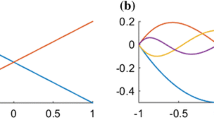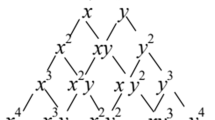Abstract
Modal analysis is commonly performed in a vehicle development process to assess dynamic responses of structure designs. This paper presents an adaptive quadrilateral refinement process for modal analysis of elastic shells based upon a posteriori error estimation in natural frequencies. The process provides engineers with an estimation of their modal analysis quality and an effective adaptive refinement tool for quadrilateral meshes. The effectiveness of the process is demonstrated on the eigenvalue analyses of two numerical examples, a shock tower cap and a roof structure. It shows that the solution error in the frequency of interest is effectively reduced through the adaptive refinement process, and the resulting frequency of interest converges to the solution of a very fine model.












Similar content being viewed by others
References
Oden JT, Prudhomme S (2001) Goal-oriented error estimation and adaptivity for the finite element method. Comp Math Appl 41:735–756
Prudhomme S, Oden JT, Westermann T, Bass J, Botkin ME (2003) Error estimation of eigenfrequencies for elasticity and shell problems. Math Models Meth Appl Sciences 13(3)
Ainsworth M, Oden JT (1997) A posteriori error estimation in finite element analysis. Comp Meth Appl Mech Eng 142:1–88
Zienkiewicz OC, Zhu JZ (1987) A simple error estimator and adaptive procedure for practical engineering analysis. Int J Numer Meth Eng 24:337–357
Zienkiewicz OC, Zhu JZ (1992) Superconvergent patch recovery techniques and a posteriori error estimation. Part I: the recovery technique. Int J Numer Meth Eng 33:1331–1364
Zienkiewicz OC, Zhu JZ (1992) Superconvergent patch recovery techniques and a posteriori error estimation. Part II: error estimates and adaptivity. Int J Numer Meth Eng 33:1365–1382
Botkin ME, Hui-Ping W, Raghupathy R (2002) Adaptive refinement of quadrilateral finite element meshes based upon a posteriori error estimation of quantities of interest. In: Proceedings of the AIAA SDM Conference, Boulder, CO, 22-25 April 2002
Wang HP, Botkin ME (2002) Comparative study of adaptive analysis processes for automotive applications. In: Proceedings of the ASME Pressure Vessels and Piping Conference, Vancouver, Canada, 4-8 August 2002
Blacker TD, Stevenson MB (1991) Paving: a new approach to automatic quiadrilateral meshing technique. Adv Eng Soft 13(5–6):811–847
Owen SJ (1998) A survey of unstructured mesh generation technology. In: Proceedings of the 7th International Meshing roundtable, Dearborn, MI, 26–28 October 1998
Botkin ME, Wang HP (in press) Adaptive mesh refinement of quadrilateral finite element meshes based upon a posteriori error estimation of quantities of interest: linear static response. Engineering with Computers (in press)
Botkin ME (2000) Modeling and optimal design of a carbon fiber reinforced composite automove roof. Engineering with Computers 16(1):16–23
Acknowledgements
The error estimation software employed in this research was developed by Prof. J. T. Oden, Dr. Serge Prudhomme and Dr. Jon Bass of the Institute for Computational Engineering and Sciences at the University of Texas at Austin, as part of the Development Of A Post-Processor For A Posteriori Error Estimation Of Quantities Of Interest project sponsored by General Motors Corporation.
Author information
Authors and Affiliations
Corresponding author
Rights and permissions
About this article
Cite this article
Botkin, M.E., Wang, HP. An adaptive mesh refinement of quadrilateral finite element meshes based upon an a posteriori error estimation of quantities of interest: modal response. Engineering with Computers 20, 38–44 (2004). https://doi.org/10.1007/s00366-004-0274-6
Received:
Accepted:
Published:
Issue Date:
DOI: https://doi.org/10.1007/s00366-004-0274-6




